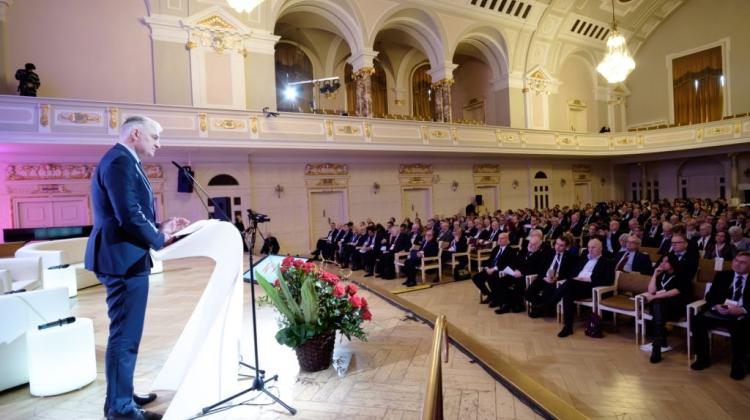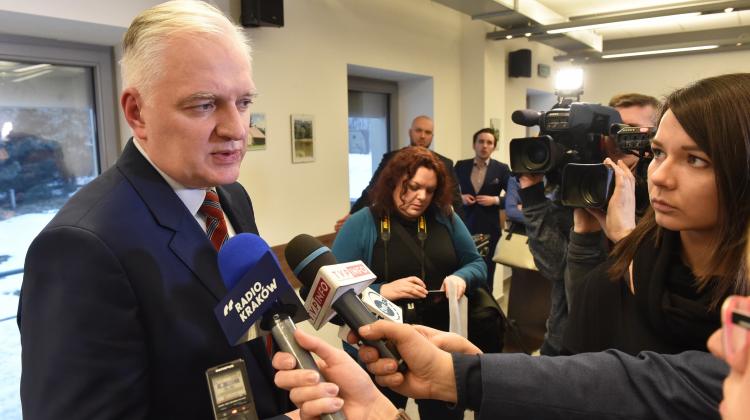Ministry of Science plans to introduce the so-called large research doctorate

Achieving scientific independence earlier, rejuvenation of the research staff, improved quality of doctorates are the expected effects of the so-called large research doctorate, which the Ministry of Science plans to introduce. Scientists with the "large doctorate" would have equal rights to habilitated doctors.
The current path of a scientific career - including doctoral studies, and about ten years habilitation - means that the average age of the so-called independent researcher in Poland is about 57 years. "That is a lot, because the most dynamic and creative period for a scientist is the age between 25 and 35 years. Independent researchers, who can conduct their own research, have reached the age in which they are no longer so creative" - told PAP Deputy Minister of Science and Higher Education Łukasz Szumowski.
He noted, however, that a simple elimination of habilitation in order to shorten the academic career path of scientists would not be enough. "This is a sensible direction, but that the quality of the current education at the level of the doctorate is too low to eliminate higher degrees and titles" - explained Szumowski.
That is why the Ministry of Science and Higher Education - similarly to the UK - plans to introduce the so-called large research doctorate. "The concept of a large doctorate can lead to shortening the career paths and earlier achievement of scientific independence. Someone who obtains large doctorate - in accordance with our concept - will become an independent scientific worker, equivalent to doctor with habilitation degree" - says Szumowski. This means that about six years after obtaining a doctoral degree, such person could independently apply for grants, the position of professor or department chair at the university, or lead research teams.
The research doctorates system could be based, for example, on so-called supervised project grants. In such a system, promoters - experienced researchers - would compete in competitions for grants to carry out specific research topics. Then they would supervise the funded projects carried out by their doctoral students. "In the first years of career a young researcher would have a mentor, a promoter who can offer advice on the research project. During this time, young researcher will learn to conduct research, be self-reliant, responsible for ongoing research. We estimate that after approximately six years such researcher would finish his doctorate as a fully educated, formed researcher" - told PAP Deputy Minister of Science.
He admitted that the concept of research doctorates still needs to be refined and supervised project grants are just one of the possible ways of its introduction. Universities - with adequate funding - could themselves announce research competitions and finance large doctorates. Supervised project grants could also be financed by the National Science Centre and the National Centre for Research and Development.
According to Szumowski, ideal place to conduct research doctorates would be research universities, which the Ministry of Science plans to introduce. "Teaching and research universities that conduct great research in some areas could also host such doctoral projects" - he said.
Introduction of research doctorates - noted Deputy Minister of Science - should lead to a situation in which the aim of doctoral studies will be conducting exploratory, innovative research; and their effect - good publications. "To achieve this goal, we need to motivate students and promoters to go in this direction" - added Szumowski.
He stressed that in addition to doctorate and research doctorate, scientists probably would still have an opportunity to get a habilitation degree. "We do not want to take away acquired rights. It seems that habilitation will remain. Besides, there are a lot of people who already have regular doctorates and want to participate in the further academic development path precisely through habilitation. If someone wants to, they can choose the old career path. However, in this new path we let young researchers - still full of creative, intellectual force - enter adult academic life with full rights. We move researcher\'s debut to a much younger generation" - described Szumowski.
In a dozen years - according to the ministry forecasts - the proposed changes should bring a pro-quality change: rejuvenation of scientific personnel, increasing the emphasis on research. "In the world, the units that conduct research are mainly universities, and would like to make it so in Poland. It should be the role of the best Polish universities" - explained Deputy Minister of Science.
Ministry of Science will present the concept of research doctorates during the program conference of the National Congress of Science "Academic career paths and the development of young scientists", which begins on Thursday in Katowice. The solution could be introduced together with the new Law on Higher Education. Ministry of Science wants to present its assumption in September.
PAP - Science and Scholarship in Poland, Ewelina Krajczyńska
ekr/ agt/
tr. RL
Przed dodaniem komentarza prosimy o zapoznanie z Regulaminem forum serwisu Nauka w Polsce.


















